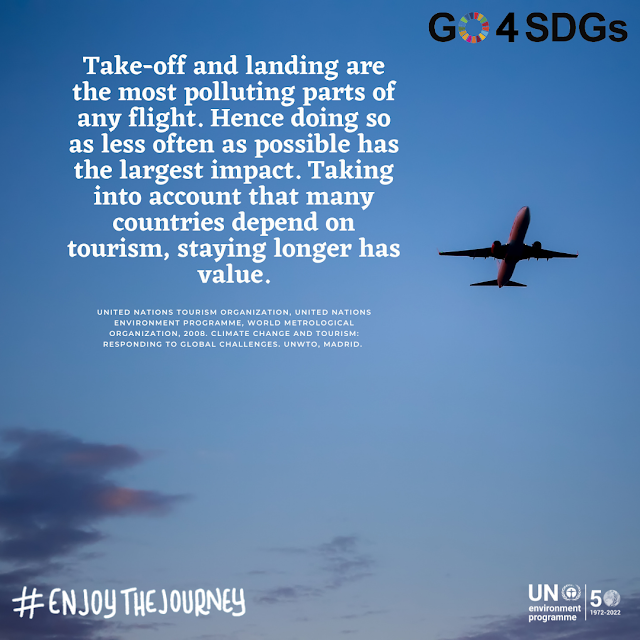Enjoy The Journey
Sustainable travel, staying local to reduce your carbon footprint
Greetings for the day,
We are on the 13th day of the most important social media challenge in the world!
What we eat, what we buy, where we live, how we live and what we do for fun all matter in a world stretched to ecological limits. Over the last 12 days, we have outlined the tangible everyday individual actions that contribute to Sustainable Development Goal 12, ensuring responsible consumption and production.
What does it mean to reduce our individual climate impact and live sustainably?
It is when our way of life, our social behaviours and our choices minimise environmental degradation (use of natural resources, CO2 emissions, waste and pollution) and support equitable socio-economic development and better quality of life for all.
Through everyday lifestyle swaps - under food, consumer goods, housing, mobility and leisure – we can move away from damaging daily actions.
These five areas that meet our everyday living needs hold the potential, if enough people swap, to support the global changes we need to meet 2030 targets.
We've covered FOOD, STUFF, MOVE and MONEY! So far, the Anatomy of Action has reached all corners of the world. This Is Amazing!
For the final area of action, we explore the importance of what we do for FUN and how it can have a positive or negative climate impact. During the next three days, we'll think about:
#EnjoyTheJourney - Sustainable travel, staying local to reduce your carbon footprint and help local economies. Being the first action of the domain, this is also the most impactful.
#StayCurious - Embracing a life of constant learning, adventure and curiosity.
#ChooseExperience - Spending more time and resources on the experiences that add value to our lives.
Enjoy The Journey
Staying local can reduce your carbon footprint, help local economies, and can be more cost effective. When you do go the distance, try to stay longer and choose better products.
For example, take-off and landing are the most polluting parts of any flight. Hence doing so as less often as possible has the largest impact. Taking into account that many countries depend on tourism, staying longer has value. And do some research on how your spending can benefit the local economy, thus supporting local culture, restaurants, artists and business.
In addition, lots of countries do not have the infrastructural means to recycle, hence cutting plastic from tourist activities can have a huge impact.
Angola - CO2 emissions from international and domestic aviation
Angola - CO2 emissions from international aviation
In 2020, CO2 emissions from international aviation for Angola was 174,118 tonnes. Though Angola CO2 emissions from international aviation fluctuated substantially in recent years, it tended to decrease through 2014 - 2020 period ending at 174,118 tonnes in 2020.
Angola - CO2 emissions from domestic aviation
Angola CO2 emissions from domestic aviation was at level of 15,974 tonnes in 2020, down from 70,936 tonnes previous year, this is a change of 77.48%.
Angola - CO2 emissions from transport
Our everyday motto is: "Let food be thy medicine and medicine be thy food.
Discover ANGOLA. 10 Best Places to Visit In Angola. Economy, History People. Visit Luanda Angola
Top 10 Most BEAUTIFUL CITIES and TOWNS in Angola
If you’re looking for inspiration on how to participate in the challenge, think of these facts:
- Take-off and landing are the most polluting parts of any flight. Hence doing so less often as possible has the largest impact. Taking into account that many countries depend on tourism, staying longer has value.
- Reading, even for short periods of time, can dramatically reduce stress levels! So embrace a life-long learning approach to enhance your overall well-being and discover what the wonderful world has to offer.






















